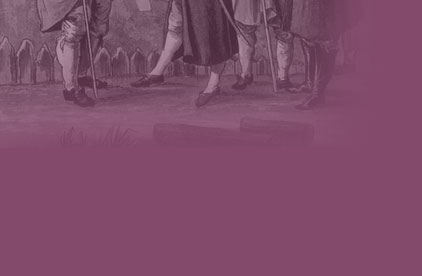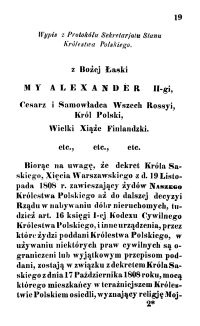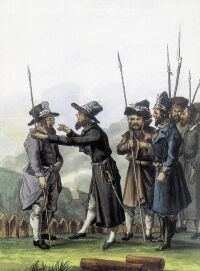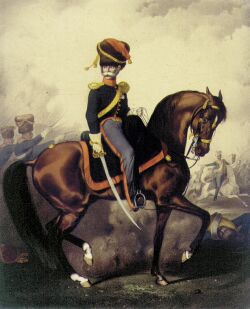





"June" ukase issued by Tsar Aleksander II on the 5th of June 1862 abolished extra taxes paid by the Jews, lifted restrictions and prohibitions on their settlement in towns and vilages, guaranteed them legal rights equal with the Christians, granted a right to buy real estates and allowed to choose profession freely.
Proclamation National Government to the Brothers Israelites, issued in Kraków on 23th February 1846 by the revolutionary National Government . It was the first official enactment issued in the Polish territory, eliminating in revolutionary way class barriers separating the Jewish population from other inhabitants of the country. As a result about 500 Jews joined the revolutionary troops.
Artur Szyk, Death of the legionary Bronisław Mansperl in the Battle of Kukle in Wołyń in 1915. This lieutenant of the I Brigade of Piłsudski's Legions, knight of the Virtuti Militari Cross, symbolizes the attitudes of the Polish Jews during the final struggle for the independence of Poland.
Henryk Wohl (1836-1907), adherent of assimilation, pro-independence activist, Director of the Treasure in the National Government. He was punished for his participation in the January Uprising (1863) and sent to Siberia, where he stayed till 1882.
|

F. K. Dietrich to the drawing by J. Głowacki, Jewish militia, 1831.
During the November Uprising the Jews served in various paramilitary units; those assimilated the most served in National Guard, less assimilated (didn't want to shave their beards) in Municipal Guard and the poorest in Militia. The Jewish soldiers and few officers - three of whom were awarded with Virtuti Militari Cross - served in regular troops as well.
Manifestation funeral of casualties of the pogrom in Wilno, 1905.
Common protest of the Polish, Russian and Jewish socialdemocrats against the pogroms.
The representatives of the Jewish community of Dęblin greet the Commander-in-Chief, Marshal Józef Piłsudski with bread and salt after the release of the town and the fortress from the Bolsheviks in 1920. During the Polish-Bolshevik War 1919-1920 in the ranks of the Polish Army there served and died Jewish officers and soldiers as well.
The consecration of the standard of the Union of the Jewish Participants in Struggles for the Independence of Poland, Przemyśl, 2nd September 1934. |

Juliusz Kossak, Colonel Berek Joselewicz (1764-1809). The participant of the Kościuszko Uprising 1794, organizer of an all-Jewish military unit. After the collapse of the Uprising he was an officer of the Polish Legions under general Henryk Dąbrowski. He was killed in the Battle of Kock being a commander of a squadron in the regiment of mounted rifles.
After the collapse of the First Republic, under the rule of the occupants the community of the Polish Jews, that numbered million people, was denied rudimentary rights and had to pay higher taxes. Not until the mid 19th century did the authorities begin lifting those restrictions. This new situation favoured the process of emancipation of the part of the Jewish intelligentsia, that moved from special Jewish districts to those inhabited by the Poles.
The progress of the process of assimilation resulted in the increased Jewish participation in Polish struggle for independence. The Jewish heroes shared a hard lot of their Polish brothers-in-arms: they died in battles, suffered from persecutions and were sent to Siberia.
Aleksander Lesser, Funeral of five casualties of manifestation in Warsaw in 1861. Next to the archbishop Feliński and the Protestant clergymen, there is rabbi Dov Berush Meisels, pro-Polish minded adherent of moderate assimilation. The participation of the Jews in patriotic manifestations resulted in favourable attitude of the Polish society toward the Jewish issue.
|

